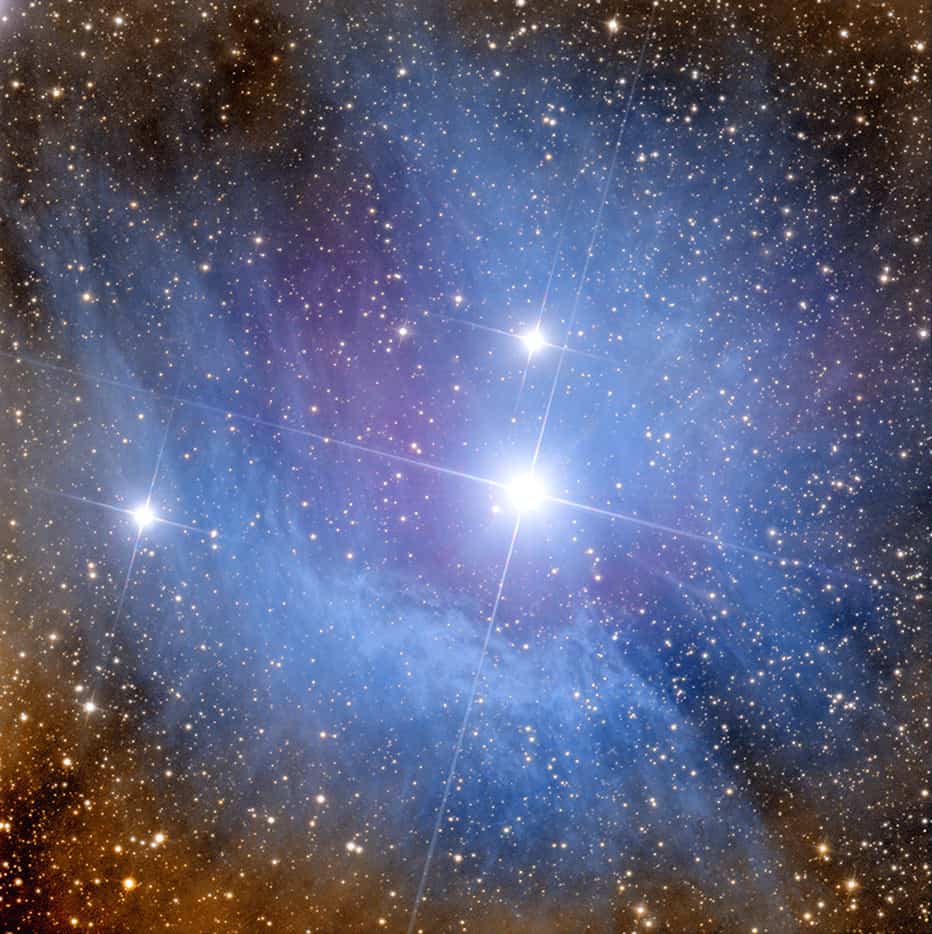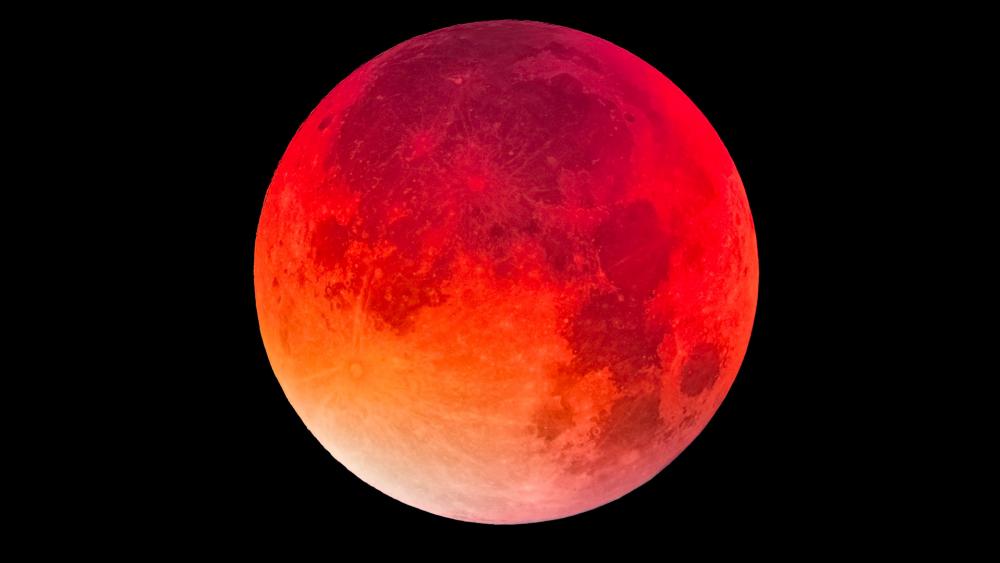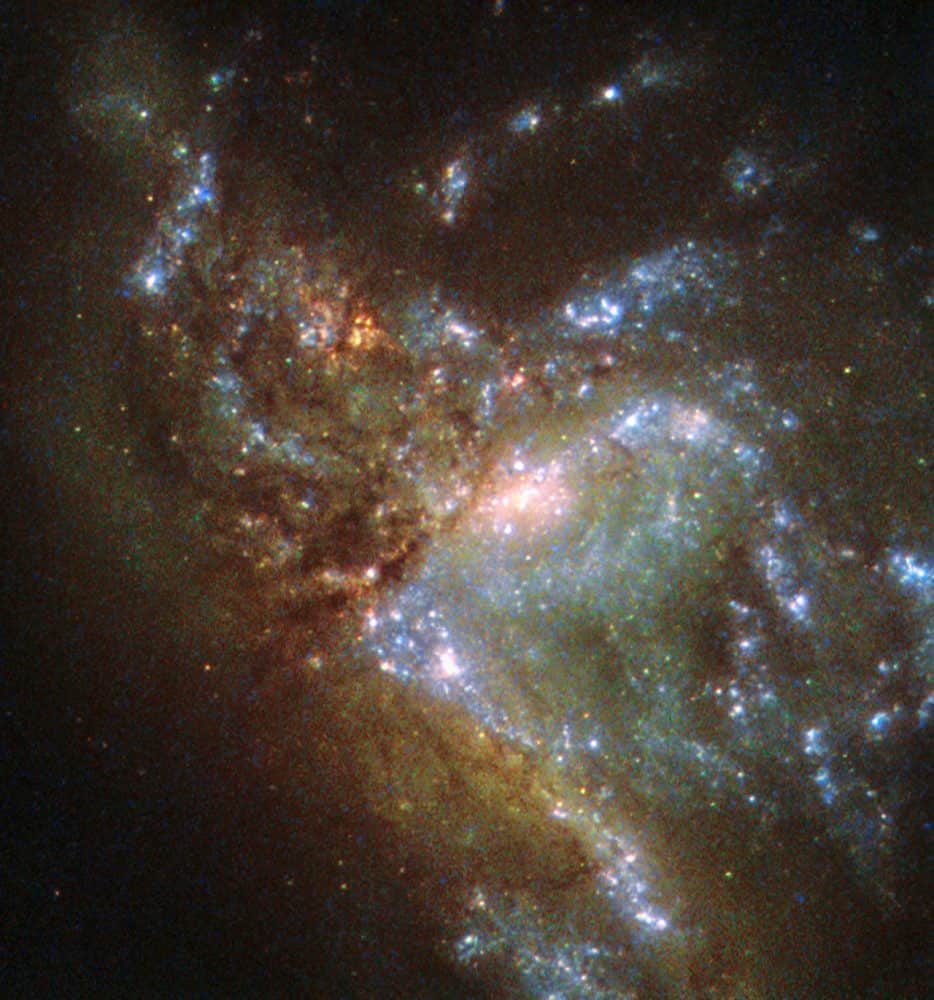Blog
IC 4605 is a reflection nebula visible in the constellation Scorpio .
It is located in the northern part of the constellation, just over 1 ° north of the red star Antares ; it is a part of the gas of the Cloud of Rho Ophiuchi that appears illuminated by the radiation of the star Scorpii , also known as HD 148605, a young blue star of main sequence of spectral class B3V. The intensity of the radiation received from the gases is insufficient to ionize its molecules, so the cloud is limited to reflect the light of the star, also appearing blue in color. The physical link between the star and the Cloud by Rho Ophiuchi is also proven by the measurement of its parallax , which places the Scorpii at a distance of about 121 parsecs (393 light years ), comparable to that of the cloud itself.
Few first northeast of the star extends one of the two major strands of the Cloud of Rho Ophiuchi, cataloged as LDN 1689; this cloud houses some very studied young star objects , among which the IRAS infrared source 16293-2422, coinciding with a multiple star in formation, stands out.
more...Richard Pierce “Richie” Havens (January 21, 1941 – April 22, 2013) was an American singer-songwriter and guitarist. His music encompassed elements of folk, soul, and rhythm and blues. He had an intense and rhythmic guitar style (often in open tunings), played soulful covers of pop and folk songs, and opened at the 1969 Woodstock Festival.
As a youth in Bedford-Stuyvesant, Havens began organizing his neighborhood friends into street corner doo-wop groups and, at age 16, was performing with the McCrea Gospel Singers.
At age 20, Havens left Brooklyn, seeking artistic stimulation in Greenwich Village. “I saw the Village as a place to escape to, in order to express yourself,” he recalled. “I had first gone there during the beatnik days of the 1950s to perform poetry, then I drew portraits for two years and stayed up all night listening to folk music in the clubs. It took a while before I thought of picking up a guitar.”
Havens’ solo performances quickly spread beyond the Village folk circles. After cutting two records for Douglas Records, he signed on with Bob Dylan‘s manager, Albert Grossman, and landed a record deal with the Verve Folkways (later Verve Forecast) label. Verve released Mixed Bag in late 1966, which featured tracks such as “Handsome Johnny” (co-written by Havens and actor Louis Gossett Jr.), “Follow”, and a cover of Bob Dylan‘s “Just Like a Woman“. Havens released his first single, “No Opportunity Necessary”, in 1967.
https://www.youtube.com/watch?v=PWXj_cEzDmU
more...Steven Dirk Gilmore (born January 21, 1943, Trenton, New Jersey) is an American jazz double-bassist.
Gilmore picked up bass when he was twelve years old and played locally in Philadelphia as a teenager. At age 17 he enrolled at the Advanced School of Contemporary Music, run by Oscar Peterson, and later in the 1960s played with Ira Sullivan and the Baker’s Dozen Big Band. He joined Flip Phillips‘s group in 1967 and remained with Phillips until 1971, after which he worked with Al Cohn and Zoot Sims, Mose Allison, The Thad Jones/Mel Lewis Orchestra, Phil Woods, Richie Cole, and the National Jazz Ensemble. In the 1980s he played with John Coates, Meredith D’Ambrosio, Dave Frishberg, Hal Galper, Tom Harrell, and Toshiko Akiyoshi, as well as with Woods; he and Woods would remain collaborators into the 1990s. In 1988 he began working with Dave Liebman, with whom he would work intermittently through the late 1990s. Other associations in the 1990s included Carol Sloane, Susannah McCorkle, Bill Charlap, and Jim Hall.
more...Fird Eaglin, Jr. (January 21, 1936 or 1937 – February 18, 2009), known as Snooks Eaglin, was an American guitarist and singer based in New Orleans. In his early years he was sometimes credited under other names, including Blind Snooks Eaglin, “Lil” Snook, Ford Eaglin, Blind Guitar Ferd.
His vocal style was reminiscent of that of Ray Charles; in the 1950s, when he was in his late teens, he sometimes billed himself as “Little Ray Charles”. He played a wide range of styles of music within the same concert, album, or even song: blues, rock and roll, jazz, country, and Latin. In his early years, he also played acoustic blues.
His ability to play a wide range of songs and make them his own earned him the nickname “The Human Jukebox.” Eaglin claimed in interviews that his musical repertoire included some 2,500 songs.
At live shows, he usually did not prepare set lists and was unpredictable, even to his bandmates. He played songs that came to him on stage, and he also took requests from the audience.
Eaglin lost his sight not long after his first birthday, having been stricken with glaucoma, and spent several years in the hospital with other ailments. Around the age of five he received a guitar from his father and taught himself to play by listening to and playing along with the radio. A mischievous youngster, he was given the nickname “Snooks” after a radio character named Baby Snooks.
more...María Dolores Flores Ruiz (21 January 1923 – 16 May 1995) better known as Lola Flores was a Spanish singer, dancer, actress. She was born at number 45, Sol Street, in the “barrio de San Miguel”, quarter of Jerez de la Frontera. Lola Flores was the eldest of three children, born to Pedro Flores Pinto (1897-1973) from La Palma del Condado (Huelva) and Rosario Ruiz Rodriguez from Sanlúcar de Barrameda (Cádiz). Lola Flores was not a gypsy, although her maternal grandfather, Manuel, who was a street vendor was half-gypsy, and her husband Antonio González el Pescaílla, a gypsy guitarist from Barcelona.
more...“For to be free is not merely to cast off one’s chains, but to live in a way that respects and enhances the freedom of others.”
Nelson Mandela
more...Tonight a bright full Moon will fade to red. Tonight’s moon will be particularly bright because it is reaching its fully lit phase when it is relatively close to the Earth in its elliptical orbit. In fact, by some measures of size and brightness, tonight’s full Moon is designated a supermoon, although perhaps the “super” is overstated because it will be only a few percent larger and brighter than the average full Moon. However, our Moon will fade to a dim red because it will also undergo a total lunar eclipse — an episode when the Moon becomes completely engulfed in Earth’s shadow. The faint red color results from blue sunlight being more strongly scattered away by the Earth’s atmosphere. A January full moon, like the one visible tonight, is referred to as a Wolf Moon in some cultures. Tonight’s supermoon total eclipse will last over an hour and be best visible from North and South America after sunset. The featured time-lapse video shows the last total lunar eclipse — which occurred in 2018 July. The next total lunar eclipse will occur only in 2021 May.
more...Andy Sheppard (born 20 January 1957) is a British jazz saxophonist and composer. He has been awarded several prizes at the British Jazz Awards, and has worked with some notable figures in contemporary jazz, including Gil Evans, Carla Bley, George Russell and Steve Swallow.
Sheppard was born in Warminster, Wiltshire, England, in 1957. At the age of 19 he emerged as a musician in the Salisbury-based contemporary quartet Sphere in the late 1970s, gigging only three weeks after picking up the saxophone. He honed his skills in the wine bars and jazz clubs of the UK and Europe in the early 1980s. He also played with world music groups and with more established improvisers such as Keith Tippett. While still with Sphere, Sheppard moved to Paris, working with French bands Lumière and Urban Sax.
In the mid-1980s Sheppard returned to the UK, playing often on Ki Longfellow-Stanshall‘s and Vivian Stanshall‘s Bristol, England-based Old Profanity Showboat, and released his self-titled debut solo album, featuring Randy Brecker and Steve Swallow, who also produced the album. The record was well received and led to Sheppard being awarded the Best Newcomer prize at the 1987 British Jazz Awards, followed by the Best Instrumentalist Award in 1988. ’87 also saw Sheppard join George Russell’s Living Time Orchestra and tour with Gil Evans.
more...Wilbur James Cobb (born January 20, 1929) is an American jazz drummer.
Some of Cobb’s most famous work is on Miles Davis‘s Kind of Blue (1959). Cobb is the last surviving player from the session. He also played on other Davis albums, including Sketches of Spain, Someday My Prince Will Come, Miles Davis at Carnegie Hall, In Person Friday and Saturday Nights at the Blackhawk, Complete, and briefly on Porgy and Bess and Sorcerer.
He has worked with Dinah Washington, Pearl Bailey, Clark Terry, Cannonball Adderley, Dizzy Gillespie, John Coltrane, Sarah Vaughan, Billie Holiday, Wynton Kelly, Stan Getz, Wes Montgomery, Art Pepper, Gil Evans, Miles Davis, Paul Chambers, Kenny Burrell, J. J. Johnson, Sonny Stitt, Nat Adderley, Benny Golson, Hank Jones, Ron Carter, George Coleman, Fathead Newman, Geri Allen, Earl Bostic, Leo Parker, Charlie Rouse, Ernie Royal, Philly Joe Jones, Bobby Timmons, Walter Booker, Jerome Richardson, Keter Betts, Jimmy Cleveland, Sam Jones, Red Garland, Joe Henderson, Eddie Gómez, Bill Evans, Jeremy Steig, Richard Wyands, Peter Bernstein, Richie Cole, Nancy Wilson, Ricky Ford, and David Amram.
more...Huddie William Ledbetter /ˈhʌdi/ (January 20, 1888 – December 6, 1949) was an American folk and blues musician notable for his strong vocals, virtuosity on the twelve-string guitar, and the folk standards he introduced. He is best known as Lead Belly. Though many releases credit him as “Leadbelly“, he himself wrote it as “Lead Belly”, which is also the spelling on his tombstone and the spelling used by the Lead Belly Foundation.
Lead Belly usually played a twelve-string guitar, but he also played the piano, mandolin, harmonica, violin, and “windjammer” (diatonic accordion). In some of his recordings, he sang while clapping his hands or stomping his foot.
Lead Belly’s songs covered a wide range of genres and topics including gospel music; blues about women, liquor, prison life, and racism; and folk songs about cowboys, prison, work, sailors, cattle herding, and dancing. He also wrote songs about people in the news, such as Franklin D. Roosevelt, Adolf Hitler, Jean Harlow, Jack Johnson, the Scottsboro Boys and Howard Hughes. Lead Belly was inducted into the Rock and Roll Hall of Fame in 1988 and the Louisiana Music Hall of Fame in 2008.
Lead Belly was born Huddie William Ledbetter to Sally and Wesley Ledbetter on a plantation near Mooringsport, Louisiana, on January 20, 1888. The 1900 United States Census lists “Hudy Ledbetter” as 12 years old, born January 1888, and the 1910 and 1930 censuses also give his age as corresponding to a birth in 1888. The 1940 census lists his age as 51, with information supplied by wife Martha. However, in April 1942, when Ledbetter filled out his World War II draft registration, he gave his birth date as January 23, 1889, and his birthplace as Freeport, Louisiana(“Shreveport”). His grave marker bears the date given on his draft registration.
more...Galician
https://www.youtube.com/watch?v=ezudAvNqM1E&list=RDEMK4ZRS0eLdKCbMDAe-Ru3oA&index=24
more...“We are going to emancipate ourselves from mental slavery because whilst others might free the body, none but ourselves can free the mind. Mind is your only ruler, sovereign. The man who is not able to develop and use his mind is bound to be the slave of the other man who uses his mind.”
more...
NGC 6052 is a pair of galaxies in the constellation of Hercules. It was discovered on 11 June 1784 by William Herschel. It was described as “faint, pretty large, irregularly round” by John Louis Emil Dreyer, the compiler of the New General Catalogue.
The two components of NGC 6052 are designated NGC 6052A and NGC 6052B, respectively. The two, attracted by each other’s gravity, have collided and are interacting with each other. NGC 6052 is currently in a late stage of merging, where the shape of the two galaxies is not distinctly defined.
SN 1982aa, a powerful radio supernova, was detected in NGC 6052.
more...Robert Allen Palmer (19 January 1949 – 26 September 2003) was an English singer-songwriter, musician, and record producer. He was known for his distinctive, soulful voice, mix of musical styles on his albums, combining soul, jazz, rock, pop, reggae, blues, and sartorial elegance. He found success both in his solo career and with the Power Station, and had Top 10songs in both the UK and the US.
His famous music videos, directed by British fashion photographer Terence Donovan, for the hits “Addicted to Love“, “Simply Irresistible” and “I Didn’t Mean to Turn You On” featured women simulating playing instruments, almost identically dressed with pale faces, dark-eye makeup and bright-red lipstick. Palmer’s involvement in the music industry began in the 1960s, covered four decades and included a spell with Vinegar Joe.Palmer received a number of awards throughout his career, including two Grammy Awards for Best Male Rock Vocal Performance, an MTV Video Music Award, and two Brit Award nominations for Best British Male Solo Artist.
Palmer died aged 54 following a heart attack on 26 September 2003.
Palmer’s father was a British naval intelligence officer stationed in Malta. Palmer moved with his family from Batley (where he was born) to Scarborough, North Yorkshire in 1949. Influenced as a child by blues, soul and jazz music on American Forces Radio, Robert Palmer joined his first band, The Mandrakes, at the age of 15 whilst still at Scarborough High School for Boys. His first major break came with the departure of singer Jess Roden from the band The Alan Bown Set in 1969, after which Palmer was invited to London to sing on their single “Gypsy Girl”.
more...Janis Lyn Joplin (January 19, 1943 – October 4, 1970), nicknamed ‘Pearl,’ was an American rock, soul, and blues singer and songwriter, and one of the most successful and widely known female rock stars of her era After releasing three albums, she died of a heroin overdose at the age of 27. A fourth album, Pearl, was released in January 1971, just over three months after her death. It reached number one on the Billboard charts.
In 1967, Joplin rose to fame following an appearance at Monterey Pop Festival, where she was the lead singer of the then little-known San Francisco psychedelic rock band Big Brother and the Holding Company. After releasing two albums with the band, she left Big Brother to continue as a solo artist with her own backing groups, first the Kozmic Blues Band and then the Full Tilt Boogie Band. She appeared at the Woodstock festival and the Festival Express train tour. Five singles by Joplin reached the Billboard Hot 100, including a cover of the Kris Kristofferson song “Me and Bobby McGee“, which reached number 1 in March 1971.Her most popular songs include her cover versions of “Piece of My Heart“, “Cry Baby“, “Down on Me“, “Ball and Chain“, and “Summertime“; and her original song “Mercedes Benz“, her final recording.
Joplin, a mezzo-soprano highly respected for her charismatic performing ability, was posthumously inducted into the Rock and Roll Hall of Fame in 1995. Audiences and critics alike referred to her stage presence as “electric”. Rolling Stone ranked Joplin number 46 on its 2004 list of the 100 Greatest Artists of All Time and number 28 on its 2008 list of 100 Greatest Singers of All Time. She remains one of the top-selling musicians in the United States, with Recording Industry Association of America certifications of 15.5 million albums sold.
Janis Lyn Joplin was born in Port Arthur, Texas, on January 19, 1943, to Dorothy Bonita East (1913–1998), a registrar at a business college, and her husband, Seth Ward Joplin (1910–1987), an engineer at Texaco. She had two younger siblings, Michael and Laura. The family belonged to the Churches of Christ denomination.
more...Horace Parlan (January 19, 1931, Pittsburgh, Pennsylvania – February 23, 2017, Korsør, Denmark) was an American hard bop and post-bop pianist and composer. He was known for his contributions to the Charles Mingus recordings Mingus Ah Um and Blues & Roots.
In his birth year, Parlan was stricken with polio, resulting in the partial crippling of his right hand. The handicap contributed to his development of a particularly “pungent” left-hand chord voicing style, while comping with highly rhythmic phrases with the right.
Between 1952 and 1957, he worked in Washington DC with Sonny Stitt, then spent two years with Mingus’ Jazz Workshop. In 1973, Parlan moved to Copenhagen, Denmark. He later settled in the small village of Rude in southern Zealand. In 1974 he completed a State Department tour of Africa with Hal Singer.
more...Welsh musician Catrin Finch plays the Welsh harp and contributes the Celtic and western classical traditions. Senegalese kora player contributes the musical influences of West Africa and his world music collaborations.
more...More Posts
- Burton Greene
- World Music with Maher Cissoko
- Daily Roots with Alton Ellis
- The Cosmos with Supercell Montana
- Marv Tarplin
- Uriel Jones
- Attila Zoller
- Wild Bill Moore
- Doc Cheatham
- World Music with Anna Mudeka
- Daily Roots with Horace Andy
- The Cosmos with NGC 1497
- Geri Allen
- Chick Corea
- Marcus Belgrave
- Emmett Hardy
- World Music with Diblo Dibala
- Daily Roots with Larry Marshall
- The Cosmos with the Eclipse 6-10-21
- Clarence Pinetop Perkins




